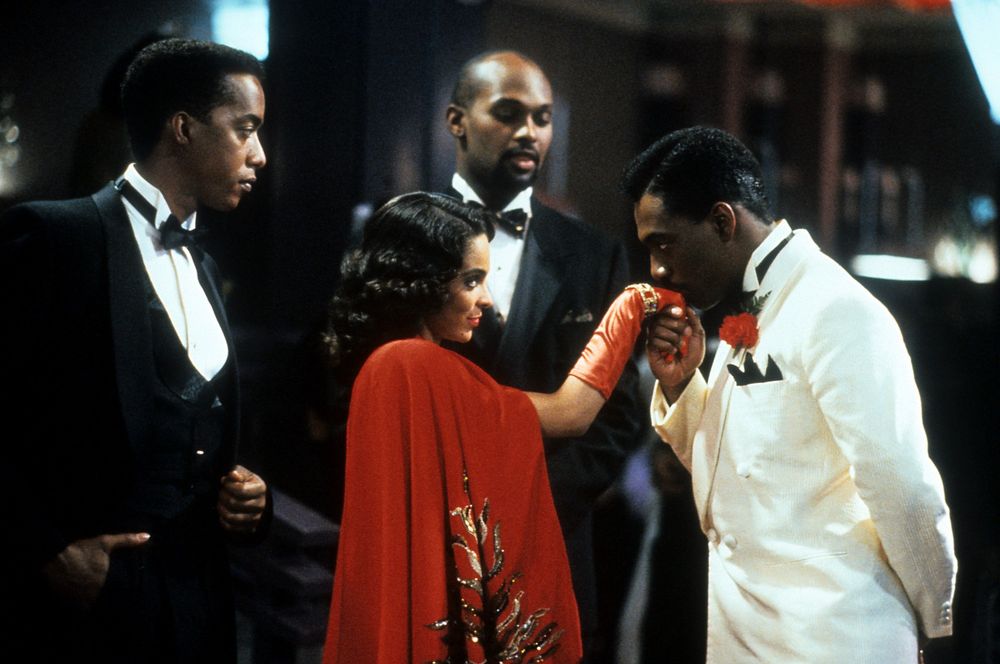Jasmine Guy And Eddie Murphy In ‘Harlem Nights’. Photo: Archive Photos/Getty Images
A few weeks ago, I aired a few controversial takes on Twitter. Nothing crazy, but also stuff you’d imagine would meet with some pushback. Derek Jeter was overrated. Scarface is really a comedy. Steph Curry didn’t deserve two MVP Awards. Beyoncé did not have a legit across-the-board classic album until Lemonade. 1999 > Purple Rain.
Weirdly, most people just agreed or disagreed. No rage, no caps lock ranting. It was downright civil in there.
At least until I mentioned that Harlem Nights was a disappointment. You would’ve thought I said Vanilla Ice was better than Rakim.
Thing is, I pulled the punch. The truth is that Harlem Nights is unmitigated trash. Yes, Harlem Nights. The 1989 crime farce written, directed, and executive-produced by Eddie Murphy remains one of the most frustrating, monumental letdowns in Black cinematic history.
Today, Harlem Nights has a paltry 21% rating on Rotten Tomatoes. But since its release, the film has become a cult classic as kids who came of age in the Def Comedy Jam era embraced the movie’s unapologetic, fuck-you-pay-me swagger.
On paper, Harlem Nights was a murderer’s row of comic prowess. Richard Pryor and Redd Foxx in the same movie alongside Murphy, who at the time was the third highest-grossing actor in Hollywood behind Harrison Ford and Carrie Fisher? (Shout out to those Star Wars receipts!) Jasmine Guy, Arsenio Hall, Danny Aiello? Even the supporting cast was at the top of their game. But the film proved to be a commercial and artistic misstep, maxing out at $95 million on a $30 million budget, a relative flop for the box office king. Critics threw most of the blame on Murphy, and deservedly so.
I tried to reason with folks. I told them that the movie, which follows the illegal exploits of a 1930’s New York City gambling house, is often forced and needed its own laugh track. I said Murphy’s direction was amateurish, and that it managed to make Pryor — one of the most animated comic actors ever — seem subdued and uninterested. (There were rumors of behind-the-scenes tensions between the two comedy heavyweights.)
To be fair, Murphy (no relation) wasn’t the first Hollywood A-lister to headline his own vanity project, nor would be the last. Kevin Costner (1997’s The Postman), John Travolta (2000’s Battlefield Earth), Mariah Carey (2001’s Glitter), and Will Smith (2013’s After Earth) are just some of the names who foisted the fruits of their swollen egos on the moviegoing public.
That’s not to say Harlem Nights didn’t have its moments. The salty back-and-forth banter between Foxx and Della Reese); the laugh-inducing gunfight between Murphy, Hall, Miguel A. Núñez Jr., and that little dude with the ridiculous one-shot pop-gun; Murphy’s alley fight with Reese (“Oh, you want to hit people with garbage cans… now I got to cut you.”); and the wonder that is Sunshine (Lela Rochon).
But those were just bits, not a focused, cohesive ensemble comedy like Coming to America or the stellar 1992 rom-com Boomerang. (Now that’s a movie worth fighting for!) And for every good bit, there was a dusty gag about stuttering or blindness that Murphy tried to dress up as actual comedy. Not only did Harlem Nights bury Pryor’s prodigious comedic instincts and waste a white-hot Robin Harris, but far too many times it relied on mean-spirited misogynistic one-liners: You could create a drinking game by the number of times Della Reese’s Madame Vera gets called “bitch.”
When you boil it down, Harlem Nights was Murphy’s stand-up routine without the charm or wit.
‘’I went through a bizarre period… when I started to please everybody,’’ Eddie Murphy told the Los Angeles Daily News in 1992. “Another 48HRS. and Harlem Nights, that was me trying to cater to what was going on around me. What happens is, you lose yourself spiritually because you get so famous. Everywhere you go, it’s adulation. You walk in a room and there’s clapping. People are always saying ‘I love you,’ ‘You’re great,’ ‘You’re the best.’ They give you money for telling jokes.”
Eddie got it. He knew it wasn’t his best work. By far.
Today, Harlem Nights has a paltry 21% rating on Rotten Tomatoes. But since its release, the film has become a cult classic as kids who came of age in the Def Comedy Jam era embraced the movie’s unapologetic, fuck-you-pay-me swagger. By the time Busta Rhymes, Diddy, and Pharrell cosigned Harlem Nights in the video for “Pass The Courvoisier Part II,” the revisionist history was complete.
The late Roger Ebert, long known to lend a fair yet sharp critical eye to films — including Black films — gave the movie two stars and backed up all my thoughts. “Eddie Murphy’s Harlem Nights is… told in cliches so broad you keep waiting for it to poke fun at itself, but it never does,” he wrote.
If Harlem Nights’ fiercest (and wrongest) supporters really want to see a great bawdy, profane, smart comedy, just watch Murphy work his comeback magic in 2019’s Dolemite Is My Name. And you won’t be laughing because you feel obligated — you’ll be laughing because it’s funny.
